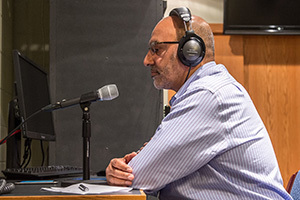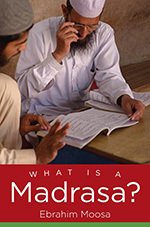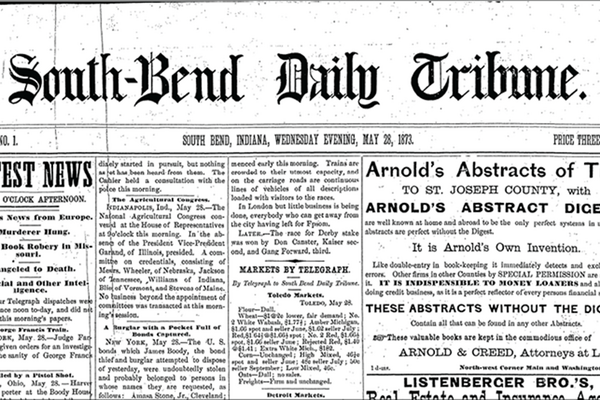 Ebrahim Moosa on NPR’s “The Diane Rehm Show”
Ebrahim Moosa on NPR’s “The Diane Rehm Show”
For Ebrahim Moosa, the chance to develop an elite Islamic studies program at a Catholic university is full of opportunity.
“Catholics and Muslims can potentially embark on a series of meaningful conversations on common concerns,” he said. “There are challenges both Catholics and Muslims face on gender issues, science, evolution, and values. How do strong religious values survive in the midst of formidable social and political challenges?
“For many reasons, I feel that I’ve come to Notre Dame at the right time in my career.”
Moosa, a professor of Islamic studies in the Kroc Institute for International Peace Studies and in the Department of History, is drawing on his personal and research experiences to develop the program’s “competitive edge.”
“We envision our program to involve multiple elements, including descriptive, normative, and applied dimensions. We will sustain this triumvirate, or triangle, in tension to get the most out of such productive tensions,” he said. “We intend to equip our students with a deep knowledge of what is going on in Islamic thought and society, and be in a position to formulate opinions as well as enter conversations about values across multiple faith traditions.”
A Stranger at Home
Being Muslim on a Catholic campus hasn’t been a challenge, he said, because people of faith have many things in common.
Some of his previous environments haven’t been so welcoming.
His research began to garner increased attention while teaching at the University of Cape Town in 1997, and he accepted an invitation to spend a semester at Stanford University. When he returned to his native South Africa, he soon became a target of urban terrorism.
“A violent Muslim vigilante group had taken the city of Cape Town hostage,” Moosa said. “As a public intellectual, I felt an obligation to intervene and speak out against such lawless individuals. As a result, my house was firebombed.”
At the urging of his Stanford colleagues, Moosa and his family quickly jumped on a plane and went back to California. After three years there, he moved to Duke University, where he taught until 2014.
He came to Notre Dame following conversations with Scott Appleby, now the Marilyn Keough Dean of the University’s Keough School of Global Affairs. He invited Moosa to join him in co-directing Contending Modernities, the global research and education initiative examining the interaction among Catholic, Muslim, and other religious and secular forces in the world. Appleby also asked Moosa to develop academic offerings focused on Islam.
“I decided Notre Dame was the place where one could begin to do an imaginative, world-class Islamic studies program,” Moosa said. “Notre Dame is a place where big ideas can be realized. It wants to excel as a global university. The study of Islam and Muslims in North America and Europe, as well as developing expertise about the Muslim world at large, would add to Notre Dame’s leadership role in global affairs.”
Changing Perspectives
Moosa, who was recently interviewed by Al-Jazeera and participated in a panel discussion on NPR’s “The Diane Rehm Show,” primarily researches Islamic law, ethics, science, and values.
“My research right now at Notre Dame is focused on how to think about questions of values, society, and Islam,” he said. “How does Islam deal with, say, democratic formation, citizenship, gender issues, and questions of science? How does Islam as a religious tradition engage the various challenges modernity presents to it?”

Moosa is the author of What is a Madrasa?, which focuses on post-secondary religious institutions in the Indo-Pakistan heartlands. In his book, he explains how a madrasa is a valuable place of learning revered by many and an institution feared by many others, especially in a post-9/11 world.
Drawing on his own years as a madrasa student in India, Moosa describes in detail the daily routine for teachers and students today. He shows how classical theological, legal, and Quranic texts are taught, and he illuminates the history of ideas and politics behind the madrasa system. He also explains why the demonization of madrasas is an incorrect perspective held by many in the West.
Moosa also is the author of Ghazali and the Poetics of Imagination, winner of the 2006 American Academy of Religion’s Best First Book in the History of Religions Award, and editor of the last manuscript of the late University of Chicago professor Fazlur Rahman, Revival and Reform in Islam: A Study of Islamic Fundamentalism. In 2005, he was named a Carnegie Scholar to pursue research on Islamic seminaries of South Asia.
True to Notre Dame’s vision, the Islamic studies program Moosa envisions will have ample opportunities for service learning and study abroad. And consistent with Notre Dame’s Catholic character, it will also be of service to the American Muslim community.
“The estimates vary, but being located in South Bend, we are in close proximity to major concentrations of Muslim Americans in Chicago, Detroit, and Indianapolis,” Moosa said. “We think our research will be of service to the American Muslim community, and we plan to optimize our location and assets, such as the Santa Fe Building in Chicago, to offer lectures and services that connect with the Muslim community.”


